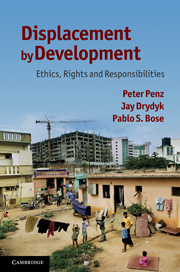Book contents
- Frontmatter
- Contents
- List of tables
- Acknowledgements
- 1 Introduction
- PART I FUNDAMENTALS
- PART II FROM COST–BENEFIT ANALYSIS TO ETHICS
- 4 Cost–benefit analysis and compensation
- 5 Guidelines and rights
- 6 The development ethics framework
- PART III FROM VALUES TO RESPONSIBILITIES
- PART IV REALIZING RESPONSIBILITIES
- Bibliography
- Index
6 - The development ethics framework
Published online by Cambridge University Press: 05 June 2012
- Frontmatter
- Contents
- List of tables
- Acknowledgements
- 1 Introduction
- PART I FUNDAMENTALS
- PART II FROM COST–BENEFIT ANALYSIS TO ETHICS
- 4 Cost–benefit analysis and compensation
- 5 Guidelines and rights
- 6 The development ethics framework
- PART III FROM VALUES TO RESPONSIBILITIES
- PART IV REALIZING RESPONSIBILITIES
- Bibliography
- Index
Summary
Discussion of displacement and development has long been polarized, and within the last ten years the policy discussion has reached an impasse, with development institutions bringing resettlement outcomes to the centre of their attention while marginalizing the issues of stakeholder participation in decision-making that were brought to the fore by the World Commission on Dams. Issues of what kinds of development can be sufficiently important to warrant displacement have been raised in different ways within UN-sponsored deliberations on international law regarding internal displacement and evictions, and in the course of civil-society advocacy for development oustees. However, this latter question has had little uptake by governments or development institutions. Our goal is to see what development ethics can contribute to getting beyond this impasse. In this chapter, we will present the evaluative framework development ethics offers at present, and in the chapters following we will examine displacement from within that framework. We begin by identifying seven values that have come to frame debates concerning ethical development over the past 50 years. Then in Chapters 7 and 8 we will identify ethical failings, in terms of these values, that can afflict displacement by and for development.
Seven core values have emerged in the second half of the twentieth century, and now in the twenty-first, as being crucial for development. They all affect how we may answer the question, ‘What must development be, for it to be worthwhile?’ And they all leave considerable room for debate about how they ought to be realized.
- Type
- Chapter
- Information
- Displacement by DevelopmentEthics, Rights and Responsibilities, pp. 116 - 152Publisher: Cambridge University PressPrint publication year: 2011

